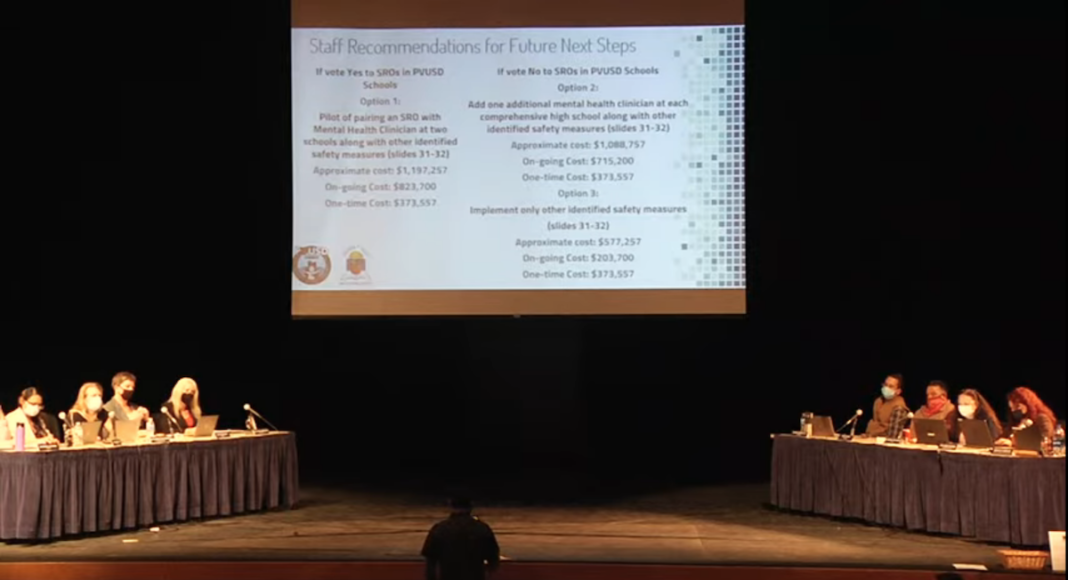WATSONVILLE—Pajaro Valley Unified School District will return School Resource Officers (SROs) to Watsonville and Aptos high school campuses, and pair them with mental health workers.
The district’s Board of Trustees approved the plan after a late-night special meeting with hours of impassioned public testimony inside the Henry J. Mello Center at Watsonville High School.
The item passed 6-1, with Trustee Maria Orozco dissenting. She later voted with the rest of the trustees to approve funding for the program’s altered return.
The plan will cost approximately $1.19 million, including a one-time cost of $373,557 and ongoing costs of $823,700.
The district is also implementing several safety upgrades, including improving security cameras, implementing a safety app and having a cell tower installed in Aptos to provide better coverage.
Pajaro Valley High School is participating in the School Success Project, which is funded through the Santa Cruz County Probation Department. That program focuses on the socio-emotional needs of the students and involves their families.
The issue came to the board after the Aug. 31 stabbing death of a 17-year-old student identified as Gerardo on the Aptos High School campus. Two students, 14 and 17, were arrested in the attack.
The trustees voted in July 2020 to remove SROs from the campuses of Watsonville, Aptos and Pajaro Valley high schools, opting instead to funnel the money to socio-emotional support services.
Among the reasoning for the decision was that law enforcement on campus makes marginalized students feel unsafe, that officers target non-white students and that the program fuels the so-called school-to-prison pipeline.
But in the wake of the murder, the district and board were widely criticized for the decision, with many suggesting law enforcement presence might have prevented it.
Still, the issue generated controversy at the special meeting, with more than 100 people addressing the board, the majority of which spoke against returning SROs to school campuses.
Joy Flynn, a parent of an Aptos Junior High School student, told the board she was disappointed in the decision.
“None of you will know what it’s like to be the mother of a Black boy, or the grandmother of a Black boy,” she said. “Now I will have to worry about my son being policed at school.”
The fact that a mental health clinician will accompany the SROs was not comforting for Flynn, who said that such treatment should start when students are young.
“We should normalize seeking mental health treatment in elementary school, instead of normalizing policing in school,” she said.
Anthony Flores, a WHS graduate who helped create a wellness center on the campus, said that service is what students need.
“Police don’t prevent crime,” he said. “We’ve never felt safe with SROs.”
But speakers also called for the return of law enforcement on campuses, saying that many students feel safer with them, and, in fact, see them as mentors.
Tiffany Chapman blamed the murder on negligence by the board and PVUSD Superintendent Michelle Rodriguez.
“I am happy about the increase to the mental health available to our children, but it cannot be at the expense of their safety,” she said.
“(Santa Cruz County) Sheriff (Jim) Hart stated that if an SRO had been on campus, the perpetrator, who was already on probation, would have been pulled off campus after his first fight. and would have been dealt with through the probation office,” Chapman said.
Countering assertions that not enough has been done in the wake of the murder, Trustee Kim De Serpa told the audience that the district has worked with mental health providers for years.
“We care about that family,” she said. “We care about everyone in this district. We feel terrible about this tremendous tragedy that occurred at Aptos High.”
De Serpa also criticized Sheriff Hart, who she said has released private information about the teen suspects and called on county counsel to investigate the matter.
Trustee Jennifer Holm said she supported the plan, but called for the district to have a say in how the SROs are chosen and asked for a one-year review of the program.
In explaining her opposition to bringing back SROs, Orozco said that she sees students suffering from mental health issues that law enforcement cannot address.
“What we’re seeing is a mental health crisis,” Orozco said.
“We’re already taking all these measures, and I don’t feel comfortable compromising,” Orozco added. “I think we owe that much to Gerardo and his family. In fact, we owe that much to all youth that we’ve lost to violence. So let’s buckle down and get to work. The SROs are not the solution.”













